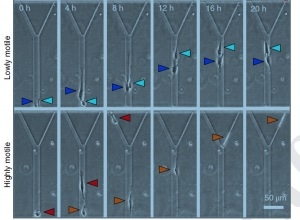A team of researchers, headed by bioengineers from Johns Hopkins University, has designed a laboratory test that can precisely pinpoint, trap, and examine the deadliest cells found in the most common and aggressive type of brain cancer in adults.

Highly mobile cells travel farther along narrow channels. Image Credit: Johns Hopkins University.
The ability of this method to trap the highly mobile and invasive proliferating cells in a fatal cancer, known as glioblastoma, could allow scientists to identify novel drugs to slow or inhibit the spread of cancer. The test can also precisely estimate which patients have the most aggressive or least form of glioblastoma.
The latest discovery has been explained in a study published in the current edition of Nature Biomedical Engineering.
Because we have the unique ability to identify those deadly cells, we envision utilizing this platform to screen potential therapeutics in order to effectively block the invasion and/or proliferation of these cells and ultimately prolong the survival of patients by putting precision medicine in practice. By subjecting these deadly cells to proteogenomic analysis, we will identify and characterize novel targets to stop these highly invasive and proliferative cells.”
Konstantinos Konstantopoulos, Study Senior Author and William H. Schwarz Professor, Departments of Chemical and Biomolecular Engineering, Biomedical Engineering, and Oncology, Johns Hopkins University
According to the study, existing testing technologies have failed to effectively estimate glioblastoma outcomes that are specific to every patient. And the methods available for single cell analysis are costly, time consuming, and “impractical for informing patient care given the short life span of patients with glioblastoma,” stated the article. Median survival times for the cancer vary between almost six months for the least aggressive type of cancer and around 29 months for the most aggressive one.
In 2019, the researchers from Johns Hopkins, who teamed up with colleagues with scientists from the Mayo Clinic and Stanford University in this glioblastoma research, demonstrated the potential of their test to differentiate metastatic from non-metastatic breast cancer cells, indicating that it may be relevant to other solid cancers.
The Johns Hopkins researchers received a U.S. patent for the test, known as Microfluidic Assay for measurement of Cell Invasion (MAqCI). The test involves placing just a small number of cells into an apparatus that looks like a fluid-filled ant farm with Y-shaped tunnels to imitate the brain’s vascular conduits.
Scientists can score the cells as the most lethal based on three major elements of metastasis—that is, the potential to move, to compress and squeeze through narrow branch channels, and to replicate.
The technique demands additional testing with a larger sample of patients, but its precision in estimating the length of survival differed from 86% in a blind retrospective study that involved 28 patients to 100% in a blind prospective study involving five patients.
Source:
Journal reference:
Wong, B. S., et al. (2020) A microfluidic cell-migration assay for the prediction of progression-free survival and recurrence time of patients with glioblastoma. Nature Biomedical Engineering. doi.org/10.1038/s41551-020-00621-9.